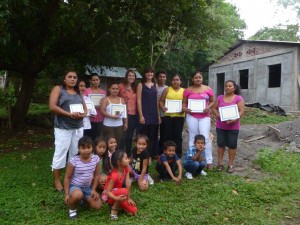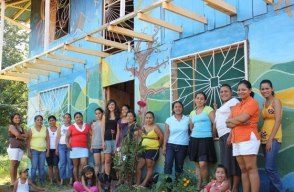May 18th, 2013, marked the shipment of the 52nd container of bicycles to EcoBici in Rivas, Nicaragua. Our relationship with this organization is the longest in our 23 years of partnership building. This current delivery contains 580 bikes that add to the 22,044 cycles already in circulation in the region and will contribute to the organization’s goal of community development and focus on enabling much-needed reforestation in the region.
 P4P is also pleased to add 6 sewing machines to the container shipment. Our readers are of course already familiar with the Clif Bar Family Foundation’s steady and generous support of our programs and so it is not unexpected that the shipping and import taxes have been covered by them. What is new here is that the sewing machines are destined for a different locale in the region. In April, we were contacted by Noelle London, a Peace Corps volunteer who is involved in small business development in Nicaragua. London wrote that she lives on Ometepe, an island close to Rivas. This island, situated on Lake Nicaragua, is steadily becoming a tourist destination and she informed us that, currently, most of the souvenirs visitors purchase there tend to be made in Granada or Masaya.
P4P is also pleased to add 6 sewing machines to the container shipment. Our readers are of course already familiar with the Clif Bar Family Foundation’s steady and generous support of our programs and so it is not unexpected that the shipping and import taxes have been covered by them. What is new here is that the sewing machines are destined for a different locale in the region. In April, we were contacted by Noelle London, a Peace Corps volunteer who is involved in small business development in Nicaragua. London wrote that she lives on Ometepe, an island close to Rivas. This island, situated on Lake Nicaragua, is steadily becoming a tourist destination and she informed us that, currently, most of the souvenirs visitors purchase there tend to be made in Granada or Masaya.
London informed us that, with reliable and efficient tools, the local women could develop a thriving base of manufacture in their community of Balgüe: “They have begun to sell in a couple of locations on the island and even in a fair in Managua but are unable to keep up with the current demand as they only have 3 working machines.”

This region is ideal for building a tourist trade in local crafts as there are many attractions to draw steady crowds yearly. The beaches on the island of Ometepe are black volcanic sand, and the lake, long separated from the ocean by an earthquake, is an ideal location to observe the many species who have adapted to this environment. Lake Nicaragua is the only lake in the world with very large freshwater sharks. Tours of the island include trips to Altagracia and its Pre-Columbian stone statues and to Magdalena Farm in Balgüe where organic coffee is grown. It is a lush land with fertile soil fed from the Volcano Maderas.
London included this statement in her e-mail to us: “I have normally been the one to shy [local women] away from donations, as they have to eventually [establish] a fully sustainable business as opposed to a project. However, after working with them on productivity countless times, I have come to understand that they simply lack the sufficient resources to really take off.” What stands out to us at P4P is London’s very realistic take on the development of self sufficiency. Charity does not build business infrastructure. Long-term goals, reliable tools, and ongoing training programs are the only hope for people in places like Ometepe to foil the existence of questionably sourced “authentic” souvenirs of their own region and take control of the industry for themselves. This is a beneficial situation for visitors of the region as well, of course. Value is added to the experience of visiting a country where the textiles and other mementos are made by local people and cooperatives. Even better if a visit to the places of manufacture are part of a tour itinerary.
“It has been a pleasure to work with these motivated and talented women. They have dealt with countless obstacles and have continued to fight to keep their business afloat,” states London. P4P is very happy to see the contents of one container contribute to an old reliable partnership in Rivas and a new and promising one on Ometepe.
